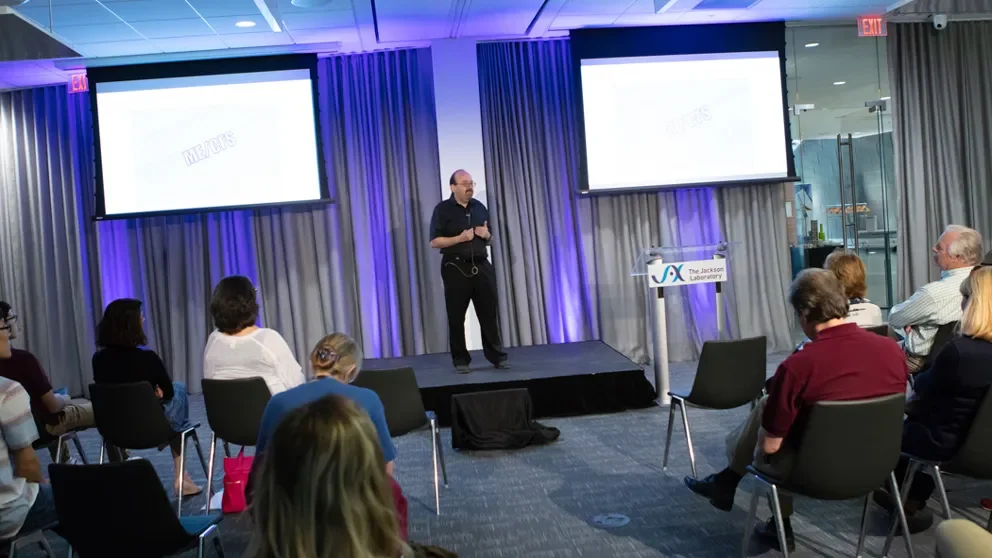Decoding chronic illness
Featured Article | June 19, 2018
In a TED-style talk at The Jackson Laboratory for Genomic Medicine in Farmington, CT, JAX Professor and immunologistDerya Unutmaz, M.D. shared his hope for a future in which something as simple as a blood test could screen for immunological biomarkers of ME/CFS and also lead to effective treatments.
The event is part of JAX’s 2018 speaker series, JAXtaposition: Cures Can’t Wait, which features TED-style talks on cutting-edge programs and research from JAX scientists and leadership.
The most neglected chronic disease
ME/CFS is a debilitating and poorly understood condition impacting between 836,000 to 2.5 million people. Its cause is currently unknown, and there is no definitive way to diagnosis the condition. “It is probably the most neglected chronic disease we have right now,” said Unutmaz. Symptoms include profound fatigue, cognitive dysfunction, sleep abnormalities and pain.
Unutmaz said that chronic inflammation – the constant irritation of the immune system, for a variety of reasons ranging from infections, our diet to our genetics – damages tissues and accelerates 80-90% of chronic diseases, including Alzheimer’s, cardiovascular disease, cancer, diabetes, and even aging itself. “It’s probably one of the biggest health problems that we have that we don’t understand very well,” said Unutmaz.
Finding a diagnostic tool
While ME/CFS has historically been very poorly understood, evidence has accumulated that the immune systems of ME/CFS patients may be at the root of the disease. This immunological connection sparked Unutmaz’ interest. Part of the reason this disease is so poorly understood, said Unutmaz, is that there’s very little funding to study it. “Funding for ME/CFS is 0.5% of the funding for HIV/AIDS per year, and there are an equal number of patients,” he said.
Fortunately, this is beginning to change. Unutmaz recently received a$10.6 million center grant from the NIH to study ME/CFS as part of a multi-institutional research effort to create one of the most highly detailed collections of clinical and biological ME/CFS patient data. The goal of this research is to enhance the knowledge and understanding of ME/CFS and create a diagnostic tool which may lead to treatments. The grant builds on his previous $3.3 million award from the National Institute of Allergy and Infectious Diseases.
Putting the patient back together
Unutmaz hypothesizes that ME/CFS is caused by a change in a patient’s microbiome after an infection. Our microbiome consists of our microbes—trillions of bacteria, viruses, and fungi that are living in and on our bodies. A misbalance in our microbes can change the makeup of our entire microbiome, which triggers an inflammatory response and causes the immune system to perceive that there is still a danger in our bodies – even when an infection is long gone.
Unutmaz and his collaborators are approaching ME/CFS by examining the unique immune profiles – the dozens of subpopulations of immune cells that are unique to every person, shaped by medical history, past infections, microbiome, diet and more - of more than 100 patients and healthy controls.
“We’re sequencing thousands of species of bacteria. We’re determining hundreds of different populations of immune cells in the same person. We’re also analyzing their metabolism and thousands of different metabolites in their blood. We’re trying to put the patient’s biology back together,” explained Unutmaz.
Using an integrated analysis that requires an incredible amount of computation and technology, he and his group are combining this data with clinical data in order to look for biomarkers of the disease.
Unutmaz says they are already seeing profound differences in the immune systems of ME/CFS patients compared to controls. “We’re very excited about that,” he said. “In my mind, there’s no question that there’s an immunological basis for this disease.” Finding a biological basis for the disease, Unutmaz, said, would enable a physician to easily diagnose ME/CFS by identifying the corresponding biomarker.
Treat the patient, not the disease
Unutmaz cited Hippocrates’ quote, “It is more important to know what sort of person has a disease than to know what sort of disease a person has” as an important summary of the value of personalized medicine. “More than 2,000 years ago, Hippocrates advised us to treat the patient, not the disease,” said Unutmaz.
“Every one of us here is different. Our biology is different,” says Unutmaz. “If we knew our immune system, knew our microbiome, our genetics, our background, our behavior, our medical history and you combine all of that, we have a signature. And we can tailor our treatment just for that person. And I think that this a fundamental shift in the way that we will treat in the future.”
For more information about the JAXtaposition series, visit www.jax.org/jaxtaposition.

